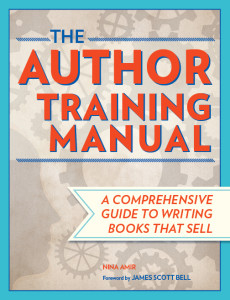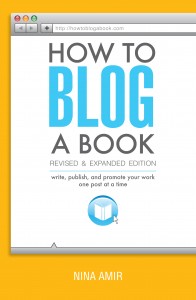 If you want to successfully blog and publish a book, you must know your readers. This step in the book blogging process, called a Market Analysis, is essential to your success and to your book’s and blog’s business plan. Without it, you might produce work that attracts totally different readers than you expect or no readers at all. Skip the Market Analysis and you might find it difficult to publish your work or sell copies if you do.
If you want to successfully blog and publish a book, you must know your readers. This step in the book blogging process, called a Market Analysis, is essential to your success and to your book’s and blog’s business plan. Without it, you might produce work that attracts totally different readers than you expect or no readers at all. Skip the Market Analysis and you might find it difficult to publish your work or sell copies if you do.
Conduct a Market Analysis in the same manner whether you blog a book or write a book the “normal” way. You can apply the same principle to analyzing your blog market if you don’t plan to bog a book as well.
How to Conduct a Market Analysis
 There are two basic steps you must complete to conduct a market analysis:
There are two basic steps you must complete to conduct a market analysis:
1. Describe your ideal reader.
Do this in great detail including demographic information. Who do you see reading your work? What are they like? What problems or concerns do they have? Where do they hang out? What do they buy? What do they like to do? Where do they live? What are their professions? How much money do they earn? Are they in relationship? What do they want and need? Create a profile of this person.
2. Determine the size of your market.
Do online research, such as on Google, and find statistics that indicate how many ideal readers exist in the world or in your country. You might look in the database of the census bureau or specific organizations related to your topic. If, for example, your book is for aspiring professional or public speakers, you could go to the official National Speakers Association site and look for data. You want numbers—hard facts that tell you there are “xx number of people” in your target market.
These two steps help you:
- write for your reader
- create content that targets your readers’ needs
- discover if your book (or blog) has enough potential readers to make it worth pursuing
I wrote about how and why to conduct a market analysis extensively in The Author Training Manual. Information on this topic is also included in How to Blog a Book in the chapter on how to create a business plan for your book.
How to Use Your Market Analysis
Conduct a market analysis before you blog your book for one reason: to create the best possible end product, in this case, a book. To do that, you need to evaluate the information you accumulated and put it to use.
You want to know if your proposed idea will address the needs of your ideal reader and if enough such people exist in the world to make publishing your book a viable business proposition. Are there enough people out there who will want and need your book to make publishing it financially feasible or profitable?
 A book or blog idea that has little or no market or indefinable markets are best abandoned—that is, if you want to produce a successful book by publishing industry standards, which means one that sells. If not, pursue your blogged-book idea as an indie projects—a book of your heart. However, an agent or publisher will not take on a project unless it has a promising market. Evaluate your project objectively with this in mind. Know that you are taking a risk if you choose to proceed with a book or blog ( or both) that has no market. Seasoned publishing professional most likely would not take such a risk.
A book or blog idea that has little or no market or indefinable markets are best abandoned—that is, if you want to produce a successful book by publishing industry standards, which means one that sells. If not, pursue your blogged-book idea as an indie projects—a book of your heart. However, an agent or publisher will not take on a project unless it has a promising market. Evaluate your project objectively with this in mind. Know that you are taking a risk if you choose to proceed with a book or blog ( or both) that has no market. Seasoned publishing professional most likely would not take such a risk.
Small publishing houses might be willing to take a risk on a book with a small or niche market—if some other factors are in place as well, such as a strong author platform or indications that your proposed book might meet or exceed competitive books’ sales figures. The readers you garner as you blog your book provide platform and an indication of your book’s selling potential. Knowing this, if you want to have your book traditionally published, you will need to look at your market statistics and make an objective determination about what type of publisher to approach.
If you have a market with promising figures, moving forward with your blogged book project—and later with a book proposal—may seem like a no-brainer. However, sometimes a large market isn’t necessarily the best thing. An agent or acquisitions editor might look at your book idea and think, “This book might not sell well because the market is too large. It’s not unique enough to gain traction there.” In such a case, finding a way to narrow the market by subject, theme or angle will help your book succeed.
With your market analysis complete, determine if your blogged-book idea seems viable or how to make it viable. Should you:
- continue forward with your project?
- go back to square one and conceive a new idea with a bigger market or a more viable niche market?
- rework or re-angle your current book idea to fit a market, thus making it a salable
project?
Have you conducted a market analysis for your blogged book or blog? What did you discover?

Huu!!! I’m so excited to read this email.thanKs!!so much!
very good!!
I’m very passionate!I want to full my goals!I’ve bigun to Write My book!
Badolo,
Thanks for your comments. You can blog a book for sure! And there is more info on how to write a nonfiction book at http://www.writenonfictionnow.com. Plus, my book, The Author Training Manual, elaborates on these concepts.
You say too large a target market might be a bad thing, and I guess too small would be as well. Can you give any idea of what might be a “good” number to aim for?
Unfortunately, Lola, I can’t. But you don’t want a target market of 500 people or even 50,000. If you only sell copies to 10% of those people, it’s not enough to sustain the book for very long. Millions is better…but a very targeted group. Not women–although they are a huge and powerful book-buying market. You want something link single moms or women business owners or women who are trying to get back in shape. Understand?
Thanks Nina. I think it’s a great idea to start any business venture with strategy like this. Of course, getting the actual data is quite a challenge for a fiction book that doesn’t quite fit into a sub-genre 🙂
Use complementary titles, Chelsea, but you do need to know your market!